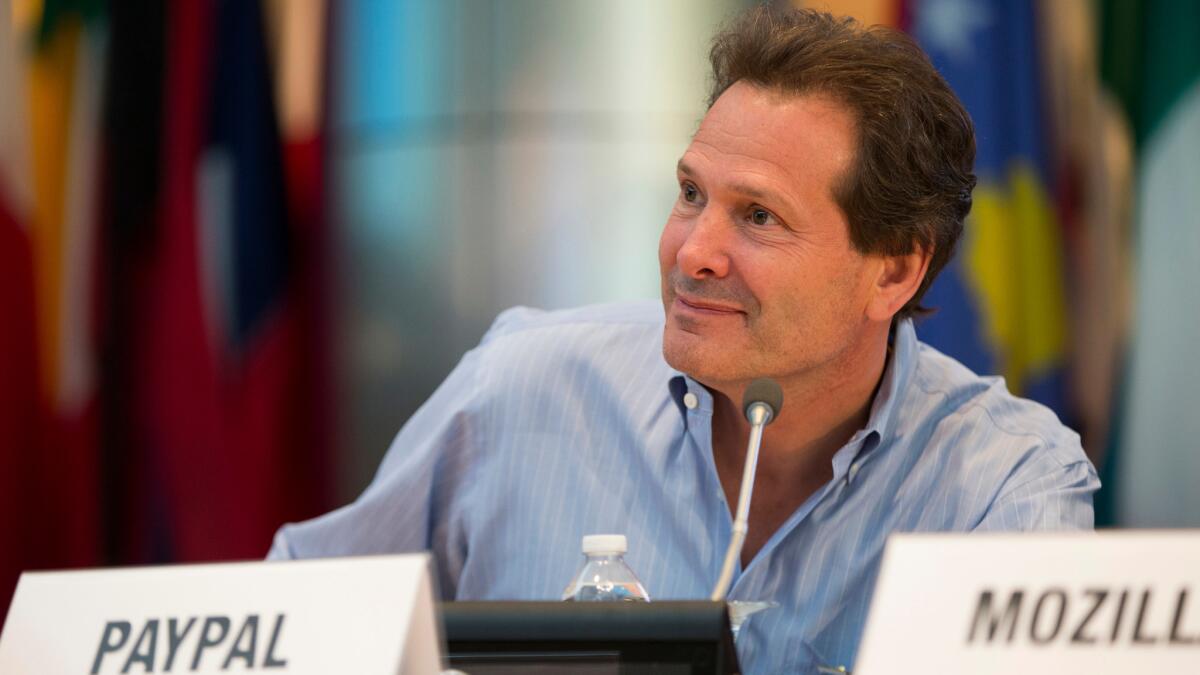Op-Ed: Corporations are suddenly jumping into political fights. Here’s why

- Share via
Corporations certainly seem more willing than they used to be to wade into contentious social and political fights. Drug giant Pfizer said this month it would ensure that its pharmaceutical products could not be used in carrying out the death penalty in the U.S. Last month, Paypal Chief Executive Dan Schulman loudly canceled plans to open an operations center in North Carolina in the wake of the state’s passage of the HB2 bathroom law. In March, Salesforce.com Chief Executive Marc Benioff, who had led an unsuccessful attempt to stop Indiana from passing a law that would provide a religious exemption for businesses to deny service to gay customers, publicly warned Georgia of consequences if it passed a similar law. (It was subsequently vetoed by Gov. Nathan Deal.) And last year, Apple threw its substantial weight behind the international climate deal.
This trend of progressive behavior in the executive suite marks a strange reversal. The default mode of companies, especially consumer-facing brands, was to avoid controversies — especially those with explicitly partisan overtones. When asked why he didn’t get involved in politics, Michael Jordan famously said: “Republicans buy sneakers, too.” Regardless of what you’re selling, you can’t afford to alienate half your potential customer base.
Although the Fortune 500 is still overwhelmingly dominated by straight white men, the C-suite is changing.
Why are chief executives of U.S.-based name-brand companies now ignoring that axiom? For a mix of personal and business reasons.
Although the Fortune 500 is still overwhelmingly dominated by straight white men, the C-suite is changing. Women run several giant corporations: IBM, General Motors, H-P, Pepsi, Lockheed-Martin. A gay man, Tim Cook, runs Apple, the nation’s most valuable company. Most companies, moreover, are based in large cities — New York, Los Angeles, Atlanta, San Francisco — where liberal values are the norm. As a result, if chief executives remain quite orthodox on taxes and regulation, they’re likely more evolved on social policy than, say, the typical Republican state legislator in North Carolina.
The C-suite evolution has been most evident on LGBT rights. Years ago, most large companies started including language about not discriminating on the basis of sexual orientation in their codes of conduct as a defensive measure — they wanted to avoid getting sued. In the past decade, however, being more accepting of gay employees has quickly become a personal issue. Many chief executives of large companies have gay friends, colleagues, and clients; some have gay children. And so these companies have generally led the charge in extending benefits to gay families, creating networking groups, and actively promoting gay rights.
Many chief executives have the ability to look back to their own corporate histories and see how well (or poorly) they responded to changing circumstances in the 1960s. “We’ve had a long history of embracing diversity and inclusion,” Target Chief Executive Brian Cornell told CNBC this month, when defending his company’s announcement that it would offer transgender-inclusive bathroom access for employees and customers at its stores. “Our company was one of the very first to use African American models in our advertising. And back then, it wasn’t well received. But sitting here today, we know we made the right decision.”Politically liberal policies also make strategic sense. To a degree, chief executives’ involvement in contentious issues highlights an outbreak of long-term thinking among a group of people who are routinely pilloried for not looking beyond the next quarter. To succeed over a period of years, you have to be able to attract the best possible employee base. Diversity and inclusion aren’t just politically correct buzzwords, they’re business realities in a country where the demographics of the next and rising generation of consumers look very different than those of the oldest.
Another factor is at work. While state legislators and national U.S. politicians play to sharply divided domestic audiences, chief executives of large companies answer to a much broader constituency. Of the S&P 500 companies that report overseas sales separately, the typical company in 2014 got 48% of total sales outside the U.S. For the very largest (and hence most influential) companies, the percentages are higher: 66% for McDonald’s, 80% for Intel. Because their primary operations are effectively abroad, these companies have to be more sensitive to global norms and laws on a host of issues.
The death penalty may be legal in many U.S. states, but it is anathema in Europe, which prohibits exporting drugs that can be used in executions. Similarly, climate change may be up for debate in the U.S., but it’s not in most of the rest of the world. Companies such as Google, Facebook, Intel or Mars operate in countries in Europe and Asia where policies on emissions are already quite strict. And if you will be operating in overseas markets where carbon is taxed heavily, it behooves you to invest in efforts that can produce affordable carbon-free electricity.
There’s a less cynical interpretation that might explain chief executives’ willingness to get involved in controversial issues: call it the YOLO theory. Chief executives of large companies today make so much money that they really don’t have to worry about their long-term viability in the system or their next job. They can see which way the wind is blowing on these issues. And so they might as well say what they really think.
Daniel Gross is executive editor of Strategy+Business.
Follow the Opinion section on Twitter @latimesopinion and Facebook
More to Read
A cure for the common opinion
Get thought-provoking perspectives with our weekly newsletter.
You may occasionally receive promotional content from the Los Angeles Times.






